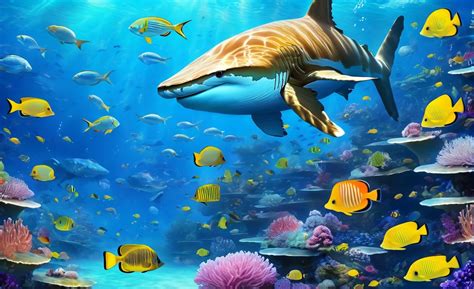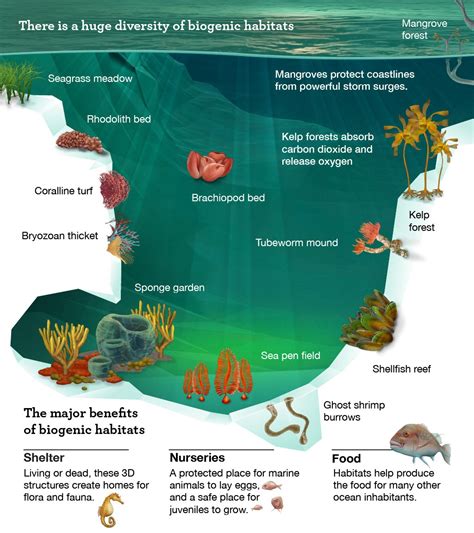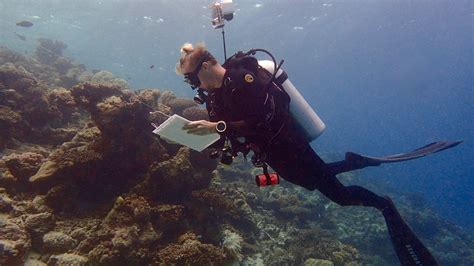Breaking News


Popular News


Explore the fascinating world of marine biology through this blog post. Learn about marine habitats, the impact of climate change, and the future of research.Marine biology is a vast and fascinating field that encompasses the study of all aspects of life in the ocean. From the smallest microorganisms to the largest marine mammals, there is a rich diversity of life forms that inhabit the world’s oceans. In this blog post, we will explore 10 fascinating facts about marine biology that will give you a greater appreciation for the wonders of the ocean.
We will begin with a brief overview of marine biology, delving into the history and scope of this scientific discipline. Next, we will examine the evolution of marine life, tracing the development of the diverse array of species that call the ocean home. We will also explore the incredible diversity of marine habitats, from coral reefs to deep-sea trenches, and the role of marine biologists in studying and protecting these environments. Additionally, we will discuss the impact of climate change on marine life and the exciting future of marine biology research. Join us as we dive into the world of marine biology and uncover some truly amazing facts about this captivating field.
Contents

Marine biology is the scientific study of organisms that live in the ocean or other marine bodies of water. This field of study encompasses a wide range of disciplines, including ecology, oceanography, zoology, and botany, among others.
Marine biologists study the behavior, physiology, and interactions of marine organisms, as well as the impact of human activities on marine ecosystems. They also play a crucial role in conservation efforts, working to protect and preserve the delicate balance of marine life.
One fascinating aspect of marine biology is the incredible diversity of life found in the world’s oceans. From microscopic plankton to massive whales, the marine environment is home to a vast array of species, each with its own unique adaptations to life in the water.
As our understanding of marine biology continues to grow, so too does the importance of this field in addressing global issues such as climate change, overfishing, and pollution. By studying marine life, researchers are able to gain valuable insights into the health of our planet and develop strategies for sustainable use of marine resources.

Marine life has undergone a remarkable evolution over millions of years, with diverse and complex organisms adapting to the changing ocean environment. One fascinating fact about the evolution of marine life is that the earliest known marine organisms appeared around 3.5 billion years ago, even before land-based life forms. These early marine species laid the foundations for the rich biodiversity we see in the oceans today.
Another intriguing aspect of marine life evolution is the transition of vertebrates from water to land. The evolutionary process of fish adapting to terrestrial life eventually led to the development of amphibians, reptiles, birds, and mammals. This transition had a profound impact on the overall biodiversity and ecological balance of marine ecosystems, as well as the terrestrial environment.
One of the most significant evolutionary events in marine life was the emergence of plankton, which are tiny organisms that drift with ocean currents. These small but vital organisms play a crucial role in the marine food web, supporting the survival and growth of larger marine species. The evolution of plankton has had a profound impact on the structure and function of marine ecosystems.
The evolution of marine life continues to be a subject of fascination and study for marine biologists and researchers. Understanding how marine organisms have adapted and evolved over time provides valuable insights into the origins and dynamics of ocean life, as well as the potential impacts of environmental changes on marine ecosystems.

Marine habitats are incredibly diverse, ranging from the shallow waters of coral reefs to the deep, dark depths of the ocean floor. One of the most fascinating aspects of marine biology is the wide array of habitats that marine creatures call home.
Many marine habitats are teeming with life, such as coral reefs, which are home to a stunning variety of fish, invertebrates, and algae. These vibrant ecosystems are known for their incredible biodiversity and are a major draw for scuba divers and marine biologists alike.
Another important marine habitat is the open ocean, where a vast array of creatures, from tiny zooplankton to massive whales, find their home. The open ocean is the largest marine habitat on Earth, covering more than half of the planet’s surface, and is essential for the health of the world’s oceans.
Marine biologists play a crucial role in studying and preserving these diverse habitats, working to understand the complex interactions between marine species and their environments. By studying the diversity of marine habitats, scientists can gain valuable insights into the delicate balance of life in the world’s oceans.
| Marine Habitats | Description |
|---|---|
| Coral Reefs | Colorful and vibrant ecosystems home to a wide variety of marine life. |
| Open Ocean | The largest marine habitat, home to a diverse range of marine creatures. |
| Deep Sea | An otherworldly environment with extreme pressure and cold temperatures, home to unique and often bizarre species. |

Marine biologists play a crucial role in studying and understanding the complex and diverse ecosystems of the world’s oceans and seas. Their work involves researching various marine organisms, including plants, animals, and microorganisms, in order to gain insights into their behaviors, habitats, and interactions with one another.
Through their studies, marine biologists also contribute to the conservation and management of marine resources, helping to ensure the sustainability of marine ecosystems and the species that inhabit them. They work closely with government agencies, environmental organizations, and policy makers to provide expert guidance on issues such as fisheries management, marine protected areas, and pollution control.
Furthermore, marine biologists are at the forefront of efforts to address the impacts of climate change on marine life. They conduct research to understand how rising temperatures, ocean acidification, and other environmental changes are affecting marine species and ecosystems, and they develop strategies to mitigate these effects and promote adaptation.
Overall, marine biologists are essential in advancing our understanding of the world’s oceans and seas, as well as in safeguarding the health and sustainability of marine environments for future generations.

Climate change has had a significant impact on marine life around the world. The rising temperatures of the oceans have led to the bleaching of coral reefs, which are vital ecosystems for many marine species. Additionally, the increase in carbon dioxide levels in the atmosphere has caused ocean acidification, threatening the survival of shellfish and other marine organisms with calcium carbonate skeletons or shells.
Another impact of climate change on marine life is the alteration of marine habitats. As the global temperatures rise, the distribution patterns of marine species are changing, affecting the ecosystems they inhabit. This has led to the disruption of food chains and the loss of biodiversity in many marine environments.
Furthermore, the melting of polar ice caps and glaciers as a result of climate change has led to rising sea levels. This has resulted in the loss of coastal habitats and nesting sites for many marine species, leading to population declines and increased competition for limited resources.
It is evident that climate change is a significant threat to the health and sustainability of marine life. Addressing these issues will require global cooperation and proactive measures to reduce greenhouse gas emissions and mitigate the impacts of climate change on marine ecosystems.

Marine biology research has come a long way in the past few decades, with significant advancements in technology and scientific knowledge. As we look to the future, it’s clear that there is still a lot to discover and understand about the world’s oceans and marine life. The future of marine biology research holds immense potential for groundbreaking discoveries and continued efforts to conserve and protect our marine ecosystems.
One fascinating aspect of the future of marine biology research is the use of advanced technology to explore the depths of the ocean. With innovations such as underwater drones, satellite imaging, and high-tech research vessels, scientists are able to uncover new species, study underwater landscapes, and monitor changes in marine environments with greater precision and detail than ever before.
Another exciting development in the future of marine biology research is the growing emphasis on conservation and sustainability. As human activities continue to impact marine ecosystems, there is a pressing need for research that addresses the threats facing marine life, such as pollution, overfishing, and climate change. Marine biologists are at the forefront of efforts to develop sustainable fishing practices, protect endangered species, and restore damaged habitats in order to ensure the health and longevity of our oceans.
Looking ahead, the future of marine biology research is also marked by collaboration and interdisciplinary study. As marine science becomes increasingly complex and interconnected, researchers from diverse fields such as ecology, genetics, oceanography, and engineering are joining forces to tackle global marine challenges. This interdisciplinary approach has the potential to yield holistic solutions and foster a deeper understanding of marine ecosystems and their intricate interconnectedness.

What is marine biology?
Marine biology is the scientific study of organisms in the ocean and other saltwater environments.
What are some common research topics in marine biology?
Common research topics in marine biology include marine life conservation, ocean acidification, and the effects of climate change on marine ecosystems.
What are some interesting adaptations of marine organisms?
Marine organisms have developed fascinating adaptations such as bioluminescence, camouflage, and the ability to survive extreme water pressure at great depths.
How does marine biology contribute to the study of climate change?
Marine biology plays a crucial role in understanding how climate change impacts marine ecosystems, including changes in ocean temperature, acidity, and sea levels.
What are some exciting career opportunities in marine biology?
Career opportunities in marine biology include marine conservation, marine mammal research, marine policy and legislation, and aquaculture.
What are some current challenges facing marine biology?
Current challenges facing marine biology include overfishing, pollution, habitat destruction, and the impact of plastic waste on marine life.
How can individuals contribute to marine biology conservation efforts?
Individuals can contribute to marine biology conservation efforts by supporting sustainable seafood practices, reducing plastic use, participating in beach cleanups, and supporting marine conservation organizations.